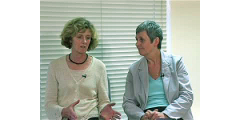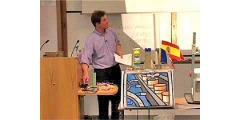Planning module content: mind-mapping, podcasting and WebCT (now Moodle)
June 26, 2007
Video >> Richard Field, Geography: “I actually planned it out, and I wanted to deliver it via what we call mind maps. Our first years have a series of lectures called study skills, or series of sessions called study skills given by a colleague of mine, and we talk quite a lot about teaching with …
Learning from lectures: a dyslexic student’s view
June 18, 2007
Video >> Kate: “Are there any teaching and learning strategies that some of your tutors may adopt that are particularly supportive of your study?” Annie Evans, student, Archaeology: “The thing I’ve found really useful is we have one lecturer who just puts everything on WebCT (now Moodle), like seminar reading lists…absolutely everything, journals…and then its …
What is the first step for students being screened for dyslexia?
Video >> Barbara Taylor, Academic Support: “I think one thing that is happening is more and more students are coming and directly asking the question ‘Am I dyslexic?’, whereas in the past we’ve had students come and say ‘I’m struggling with this’ or ‘my essay’s not getting quite the good marks’ and you work with …
Dyslexic students and exams: giving effective feedback on performance
Video >> Kate: “What are the common problems that you hear about in relation to the formal written examinations as faced by a dyslexic student?” Barbara Taylor: “A number of my students sit with me and actually go through past papers as part of their preparation for exams. They are really anxious about answering the …
How do academic staff get to know a student is identified as dyslexic?
Video >> Kate: “What ways do you end up corresponding and communicating with their academic staff?” Christine Carter, Academic Support: “I think there would be, in the first stage, there’s sort of a systems approach almost, really, or that’s what it tends to end up feeling like although it isn’t actually that. “When the report from …
Support for developing writing skills
Video >> Kate: “Students are going to need to develop very high levels of writing and argument and different ways of presenting their ideas and the concepts that they’re learning about, how do you focus in and help them learn and develop those writing skills at such a high level?” Andrew Fisher, Philosophy: “First off …
Advising students on reading: prioritising reading lists
Video >> Kate: “What kind of help and support do you give for students in helping them focus and direct their readings, in your area?” Andrew Fisher, Philosophy: “Well, I think all lecturers do this; in the module guide I give quite a detailed reading list and that is split up by lecture, so in …
Linking research and teaching
February 21, 2007
Video >> Ed: “Normally we are lecturing in courses where we do research, on the whole we do. In engineering particularly we have a real problem in recruiting engineers to do PhDs and getting a good one is even harder. “So it’s part of my philosophy, that wherever possible we talk about research in the …
“Please turn on your mobile phones” – ubiquitous computing in the classroom
January 30, 2007
Mette Asmild, Andrew Jackson, Benson Lau and Nick Mount: “The adoption of the mobile telephone has revolutionised social and commercial communication in the 21st Century. Whilst it is estimated that the majority of students in British higher-education (HE) use mobile-‘phones and text/SMS-messaging, the learning benefits of adopting and supporting mobile ‘phone text-messaging communication from students …
Development and evaluation of a re-usable learning tool to supplement didactic lectures
January 29, 2007
Jo Leonardi-Bee: “The Division of Epidemiology and Public Health teaches Evidence Based Practice/Medicine (EBPM) to a variety of postgraduate courses. A common theme across these courses is to enable students to put theory from didactic lectures into practice using computer based statistical software packages. However, there are no practical sessions to accompany a particularly difficult …










